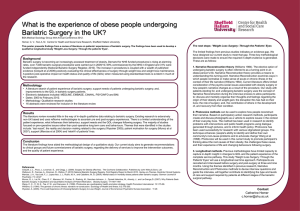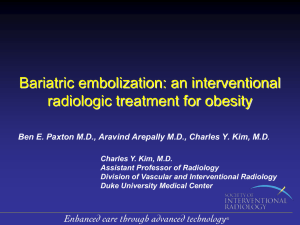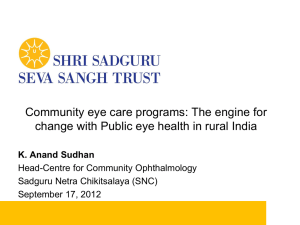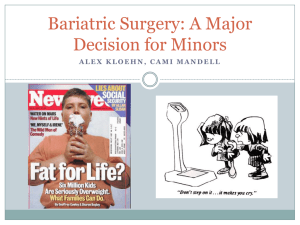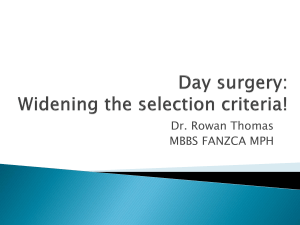Bariatric Surgery
advertisement
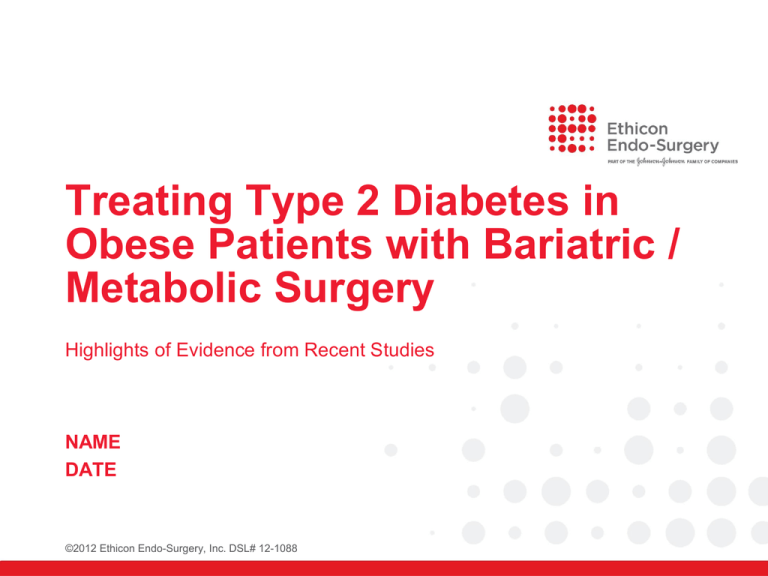
Treating Type 2 Diabetes in Obese Patients with Bariatric / Metabolic Surgery Highlights of Evidence from Recent Studies NAME DATE ©2012 Ethicon Endo-Surgery, Inc. DSL# 12-1088 Metabolic Surgery Metabolic Surgery defined: Alteration of the gastrointestinal tract that affects cellular and molecular signaling leading to a physiologic improvement in energy balance, nutrient utilization and metabolic disorders. Kaplan LM, Seeley RJ, Harris JL. Bariatric Surgery and the Road Ahead, Bariatric Times, 9 (9): Supplement C, September 2012. http://bariatrictimes.epubxp.com/i/82655 2 Evidence Summary • Recent RCT evidence supports cohort studies & metaanalyses showing bariatric / metabolic surgery can lead to improvement or resolution of Type 2 Diabetes (T2DM) & other CV co-morbidities – and reduce medication usage • New data shows bariatric surgery may prevent T2DM • Bariatric surgery has demonstrated safety similar to many other general surgery procedures • Major professional medical societies support bariatric surgery – for treatment of T2DM in severely obese patients (BMI>40), and also for obese patients with poorly controlled or uncontrolled diabetes (BMI>35). page 3 Implications for Payers Short-term: Bariatric / metabolic surgery is able to achieve improved glycemic control of Type 2 diabetes in selected obese patients (BMI>35). o Benefits for up to 2 years now shown in RCTs and up to 5 years in matched cohort studies with large groups of patients Long-term: Durability of this effect has yet to be fully characterized & potential benefits have yet to be definitively proven in routine clinical practice. o Exception: Swedish Obesity Subjects study* – 15+ year evidence suggests CV benefit, T2DM prevention & prolonged glycemic control * Sjostrom, L et al. Bariatric Surgery and Long-term Cardiovascular Events. JAMA 2012; 307(1):56-65 Carlsson, L et al, Bariatric Surgery and Prevention of Type 2 Diabetes in Swedish Obese Subjects. NEJM 2012; 367:695-704. 4 Implications for Referring Physicians Bariatric / metabolic surgery can achieve better control of Type 2 diabetes with much less medication in select obese patients (BMI>35) o Focus on those patients who are at highest risk of a CV event: • Younger (under 60) • Treated less than 10 years • Difficulty maintaining glycemic control with pharmacological agents. • Having at least one other CV risk factor in addition to T2DM, e.g. elevated insulin, hypertension and/or dyslipidemia. • Difficulty maintaining acceptable weight (almost all T2DM patients). o Surgery is a therapeutic intervention, not just for severely obese patients. o Mode of action of bariatric surgery is metabolically analogous to many T2DM medications with positive impact on GLP-1 & insulin sensitivity. Sjostrom, L and others. Bariatric Surgery and Long-term Cardiovascular Events. JAMA 2012; 307(1):56-65. Berry, J. and others. Lifetime Risks of Cardiovascular Disease. NEJM 2012; 366:321-29. 5 Body of Evidence High Quality (Level I & II-1,2) Studies on Bariatric / Metabolic Surgery in Diabetic Patients Investigator Study Type # Diabetic Patients Primary Endpoint Study Duration Carlsson Non-randomized, prospective, controlled 3429 pts, 2 arms (1658 surgery) Rate of incident type 2 diabetes mellitus 15 years STAMPEDE (Schauer)* RCT, single center 150 pts, 3 arms HbA1c < 6 with or w/o meds Year 1 of 5-year study Mingrone RCT, single center 60 pts, 3 arms HbA1c < 6.5 without meds 2 years Buchwald* Systematic Review & Meta-Analysis Klein* Matched Cohort, Claims data 1600 pts, 2 arms Economic impact & clinical benefits of bariatric surgery 3 years AHRQ (Segal)* Matched Cohort, Claims data 8400 pts, 2 arms (2100 surgery) Impact of surgery to reduce utilization of CV meds Year 1 of 3-year study Bolen* Matched Cohort, Claims data 14,000 pts, 2 arms (6300 surgery) % Obesity-related comorbidities between groups 5 years Cohen Non-randomized, prospective 66 pts, 1 arm Safety and % of patients experiencing diabetes remission 5 years (median) * Supported by a grant from Ethicon Endo-Surgery 7 135,000 pts, 621 studies, Effect of bariatric surgery on 888 arms Type 2 diabetes N/A Discussion…. “What are your thoughts?” Clinical Evidence: STAMPEDE Surgical treatment and medications achieved glycemic control in more patients than medical therapy alone. Schauer PR, Kashyap SR, Wolski K, et al. Bariatric Surgery versus Intensive Medical Therapy in Obese Patients with Diabetes. N Engl J Med. 2012; 366:1567-1576. Study supported by a grant from Ethicon Endo-Surgery. STAMPEDE Study Design * As defined by ADA guidelines, including lifestyle counseling, weight management, frequent home glucose monitoring, and the use of newer drug therapies. page 10 STAMPEDE Results: Significantly More Diabetic Patients at Glycemic Control with Bariatric / Metabolic Surgery “In obese patients with uncontrolled type 2 diabetes, 12 months of medical therapy plus bariatric surgery achieved glycemic control in significantly more patients than medical therapy alone.” Patients at Glycemic Control, 12 months 45% 40% 42%* 35% 37% ** 30% 25% 20% 15% 10% 12% 5% 0% Medical Therapy Medical Therapy + Gastric Bypass Medical Therapy + Sleeve Gastrectomy *p=0.002 **p=0.008 Glycemic control: HbA1c < 6.0% with or without diabetes medications, 12 mo after randomization. Figures adapted from study data. page 11 STAMPEDE Results: Average levels of HbA1c were also significantly lower after Bariatric / Metabolic Surgery “Mean levels of glycated hemoglobin and fasting plasma glucose were significantly lower in each of the two surgical groups than in the medical therapy group”(p<0.001). page 12 STAMPEDE Results: Significant Decreases in Diabetic Medication Usage with Bariatric / Metabolic Surgery The average number of diabetic medications per patient per day tended to increase in the medical therapy group but decreased significantly in each surgical group (p<0.001): > 50% of patients in each surgical group used NO diabetes medications at 12 months. page 13 Clinical Evidence: Mingrone Bariatric surgery resulted in better glucose control than did medical therapy Mingrone, G, et. al. Bariatric Surgery versus Conventional Medical Therapy for Type 2 Diabetes, N Engl J Med 2012; 366:1577-1585. Mingrone et al. Study Design page 15 Mingrone Study Glycated Hemoglobin Levels during 2 Years of Follow-up 16 New Clinical Evidence: Swedish Obese Subjects (SOS) Bariatric surgery appears to be markedly more efficient than usual care in the prevention of Type 2 diabetes in obese persons. Carlsson LMS, Peltonen M, Ahlin S et al, Bariatric Surgery and Prevention of Type 2 Diabetes in Swedish Obese Subjects. N Engl J Med 2012; 367:695-704. Carlsson et al. Study Design 18 Carlsson et al. Results: Significantly lower incidence of Type 2 Diabetes in Bariatric / Metabolic Surgery group 19 Sjostrom et al. (2012) Bariatric Surgery Prevents CV Events “High insulin may be a better selection criteria for bariatric surgery than high BMI, as far as CV events are concerned” Sjostrom, L et. al., Bariatric Surgery and Long-term Cardiovascular Events. JAMA 2012; 307(1):56-65; illustration from page 63. 20 Clinical Evidence Bariatric / Metabolic Surgery and Diabetes Management Matched Cohort Studies / Administrative Claims Data Buchwald: Systematic Review & Meta-Analysis (2009) T2DM resolved or improved in 87% of patients following bariatric surgery 100% 99% 87% 81% 87% 85% Gastroplasty Gastric Bypass 80% 60% 40% 20% 0% Total Total Gastric Banding Resolved BPD/DS Resolved or Improved • Systematic review & meta-analysis reviewing 621 studies including 135,246 patients • Overall, T2DM 87% resolved or improved (78% resolved) for patients after bariatric surgery Buchwald H, Estok R, Farbach K, et al. Weight and Type 2 Diabetes after Bariatric Surgery: Systematic Review and Meta-analysis. Am J Med. 2009;122(3):248-256. Figure adapted from source data. Data included includes 621 studies with 888 treatment arms & 135,246 patients; 103 treatment arms with 3188 patients reported on resolution of diabetes. 22 Klein: 3-Year Matched Cohort Analysis (2011) 46% fewer T2DM-related claims for patients following bariatric surgery • 3-year matched cohort analysis comparing claims from 1,616 privately insured patients (808 per cohort) • At 6 months, 28% of surgery patients reported a diabetes claim vs. 74% of control patients (p<0.001) • The trend in diabetes claims was sustained to 3 years. Source: Klein S, Ghosh A, Cremieux PY, Eapen S, McGavock TJ. Economic impact of the clinical benefits of bariatric surgery in diabetes patients with BMI ≥35 kg/m2. Obesity. 2011;19:581-587. 23 Bolen: 5-Year Matched Cohort Analysis (2012) Lower proportion – and likelihood - having T2DM at 5yr following bariatric surgery • 5-year matched cohort analysis comparing 22,693 obese patients with versus without bariatric surgery from seven BCBS plans • The proportion of patients with T2DM at 5 years was 18% lower with bariatric surgery (15% vs. 33%) • Bariatric surgery patients had a 31% lower likelihood (odds ratio) of having T2DM at 5 years Source: Bolen, Shari and others. Clinical Outcomes after Bariatric Surgery: A Five-Year Matched Cohort Analysis in Seven US States. Obesity Surgery (2012) 22: 749-763, Figure adapted from source data. Non-concurrent, matched cohort study following 22,693 persons who underwent bariatric surgery using logistic regression between groups for up to 5 years. 24 Clinical Evidence Bariatric / Metabolic Surgery and Diabetes Management (BMI 30-35) Prospective Study Cohen: 5-Year Study of Diabetic Patients (2012) 88% of diabetic patients without severe obesity showed diabetes remission • Study of 66 consecutive diabetic patients with BMI 30-35 who underwent RYGB. • At median 5 years, durable diabetes remission occurred in 88% of cases, and diabetes improvement in an additional 11%. • There was no recurrence of diabetes following remission during [the] six-year follow-up. • Hypertension and dyslipidemia also improved, yielding 50-84% reductions in predicted 10-year cardiovascular disease risks of fatal and nonfatal coronary heart disease and stroke. Source: Cohen RV, Pinheiro JC, Schiavon CA et al. Effects of gastric bypass surgery in patients with type 2 diabetes and only mild obesity. Diabetes Care 2012; 35:1420-1428. 26 Clinical Evidence Bariatric / Metabolic Surgery and Medication Usage Matched Cohort Studies/Administrative Claims Data Segal: AHRQ 1-Year Cohort Study (2010) 76% decline in diabetes medication use at 12 months post-surgery (p≤0.0001) ■ nonsurgical group ◊ surgical group • 3-year cohort study using BCBS data from 7 plans, covering 6,235 patients (34% of whom had T2DM) • 55% decrease in the mean number of diabetes medications within three months • Patients without surgery had an increase in mean number of diabetes medications during the same period Source: Segal JB, Clark JM, Shore AD, et al. Prompt reduction in use of medications for comorbid conditions after bariatric surgery. Effective Healthcare Research Report No. 28. Rockville, MD: Agency for Healthcare Research and Quality; 2010. (Fig 1, page 14) 28 Segal: AHRQ 1-Year Cohort Study (2010) Significant declines in cardiovascular medication use at 12 months post-surgery • Use of medication for hypertension & hyperlipidemia declined 51% and 59%, respectively, at 12 months post-surgery(p<0.0001) • Patients without surgery had an increase in medications for hypertension and hyperlipidemia Source: Segal JB, Clark JM, Shore AD, et al. Prompt reduction in use of medications for comorbid conditions after bariatric surgery. Effective Healthcare Research Report No. 28. Rockville, MD: Agency for Healthcare Research and Quality; 2010. (Fig 1, page 14) 29 Klein: 3-Year Matched Cohort Analysis (2011) 56% fewer diabetes prescriptions were filled for bariatric surgery patients • 3-year matched cohort analysis covering 1,616 obese patients with diabetes (808 per cohort) • Six months post-surgery, only 34% of surgery patients had filled a prescription for diabetes medication in the previous three months, compared to 90% of control patients (p<0.001) • This difference is sustained to the end of the study period (three years) Source: Klein S, Ghosh A, Cremieux PY, Eapen S, McGavock TJ. Economic impact of the clinical benefits of bariatric surgery in diabetes patients with BMI ≥35 kg/m2. Obesity. 2011;19:581-587. Figure adapted from study data. 30 Klein: 3-Year Matched Cohort Analysis (2011) Significantly lower supply costs in diabetes medication for surgery patients P < 0.001 • Total diabetes medication costs decreased significantly among surgery patients relative to controls. • 3 months after bariatric surgery, the average total cost of diabetes medications and supplies for surgery patients was $33, compared to $123 for control patients (p<0.001) • Total monthly prescription drug costs for surgery patients were 72% lower at two years. Source: Klein S, Ghosh A, Cremieux PY, Eapen S, McGavock TJ. Economic impact of the clinical benefits of bariatric surgery in diabetes patients with BMI ≥35 kg/m2. Obesity. 2011;19:581-587. Figure adapted from study data. 31 Clinical Evidence Bariatric Surgery Safety Matched Cohort Studies/Administrative Claims Data CMS: Inpatient Discharge Data (2010) Morbidity & mortality rates of gastric bypass are similar to other common procedures Source: Direct Research, LLC, Center for Medicare and Medicaid Services, FY 2010 MedPAR, Medicare Fee-for-Service Inpatient Discharges with Selected Procedures 33 UHC Database: Surgery Data (2012) Morbidity & complication rates of laparoscopic bariatric surgery are similar to other laparoscopic general surgery procedures Outcomes of laparoscopic procedures in general surgical operations between 2006 and 2009 N Utilization of laparoscopy LOS* (days) Complications* Mortality* Bariatric surgery 54,885 90.0% 2.3 ± 2.8 6.3% 0.06% Cholecystectomy 54,782 81.4% 3.3 ± 3.8 8.3% 0.18% Antireflux surgery 8,339 79.3% 2.9 ± 4.3 10.7% 0.02% Appendectomy 51,077 71.5% 1.6 ± 1.3 3.5% 0.02% Colectomy 21,761 18.9% 5.6 ± 4.6 21.5% 0.54% Ventral hernia repair 25,885 8.1% 3.2 ± 3.4 14.0% 0.24% Rectal resection 2,392 7.4% 6.9 ± 5.1 25.0% 0.57% Operations * Outcome of laparoscopic operations; LOS: length of stay Source: Nguyen B, Richardson JF, Smith B et al. Utilization of laparoscopy in general surgical operations at academic centers. 2012 ASMBS Abstracts. PL-106. 34 Conclusions & Recommended Next Steps Conclusions The evidence has shown that bariatric / metabolic surgery : • Helped Type 2 diabetic patients achieve glycemic control more effectively than intensive medical therapy within 1 year (STAMPEDE & Mingrone) • Resolved or improved Type 2 diabetes and other obesity-related CV comorbidities for up to 5 years (STAMPEDE, Buchwald, Klein and Bolen) • Reduced medication use for Type 2 diabetes and other CV comorbidities for up to 3 years (STAMPEDE, AHRQ/Segal and Klein) • Was more efficient than usual care for the prevention of Type 2 diabetes in persons with obesity at 15 years (Carlsson) • Reduced the risk of cardiovascular death (myocardial infarction or stroke) compared to customary intervention at 15 years (Sjostrom) • Resulted in morbidity / mortality rates similar to well-established general surgery procedures such as gallbladder surgery and hysterectomy (CMS) • Is viewed an acceptable treatment option for obese patients with T2DM (medical societies including the ADA, AHA, IDF, AACE & the Endocrine Society) 36 Next Steps – (Encourage referring physicians & PCPs …) To recommend bariatric / metabolic surgery to selected obese patients (BMI>35) with Type 2 diabetes to achieve better control of their diabetes with much less medication: o Rethink surgery as a therapeutic intervention, not just for severely obese patients. • Mode of action of bariatric surgery is metabolically analogous to many T2DM medications with positive impact on GLP-1 & insulin sensitivity. o Focus on those patients who are at highest risk of a CV event: • Younger (under 60) • Treated less than 10 years • Difficulty maintaining glycemic control with metformin • Having at least one other CV risk factor in addition to T2DM, e.g. elevated insulin, hypertension and/or dyslipemia. • Difficulty maintaining acceptable weight (almost all T2DM patients). * Sources: Sjostrom, L and others. Bariatric Surgery and Long-term Cardiovascular Events. JAMA 2012; 307(1):56-65. and Berry, J. and others. Lifetime Risks of Cardiovascular Disease. NEJM 2012; 366:321-29. page 37 Discussion…. “What are your thoughts?” Bariatric Surgery - Medical Society Support A growing consensus favors bariatric surgery “Bariatric surgery should be considered for adults with BMI ≥ 35 kg/m2 and type 2 diabetes, especially if the diabetes is difficult to control with lifestyle and pharmacologic therapy.” – American Diabetes Association (2009) “When indicated, surgical intervention leads to significant improvements in decreasing excess weight and comorbidities that can be maintained over time.” – American Heart Association (2011) “Bariatric surgery is an appropriate treatment for people with type 2 diabetes and obesity not achieving recommended treatment targets with medical therapies” – International Diabetes Federation (2011) “The beneficial effect of surgery on reversal of existing DM and prevention of its development has been confirmed in a number of studies” – American Association of Clinical Endocrinologists (2011) Sources: American Diabetes Association. Standards of medical care in diabetes – 2009. Diabetes Care 2009; 32(S1):S13-S61, Poirier P, Cornier M-A, Mazzone T et al. Bariatric surgery and cardiovascular risk factors: A scientific statement from the American Heart Association. Circulation 2011; 123:00-00. International Diabetes Federation. Bariatric surgical and procedural interventions in the treatment of obese patients with type 2 diabetes. 2011. Handelsman Y, Mechanick JI, Blone L et al. American Association of Clinical Endocrinologists medical guidelines for clinical practice for developing a diabetes mellitus comprehensive plan. Endocr Prac 2011; 17(Suppl 2). page 40 A growing consensus favors bariatric surgery “The Endocrine Society recommends that practitioners consider several factors in recommending surgery for their obese patients with type 2 diabetes, including patient’s BMI and age, the number of years of diabetes and the assessment of the (patient’s) ability to comply with the long-term lifestyle changes that are required to maximize success of surgery and minimize complications.” “… remission of diabetes, even if temporary, will still lead to a reduction in the progression to secondary complications of diabetes (such as retinopathy, neuropathy and nephropathy), which would be an important outcome of … surgery.” – The Endocrine Society (March 2012) Source: The Endocrine Society, Evaluating the Benefits of Treating Type 2 Diabetes with Bariatric Surgery, March 30, 2012. page 41


